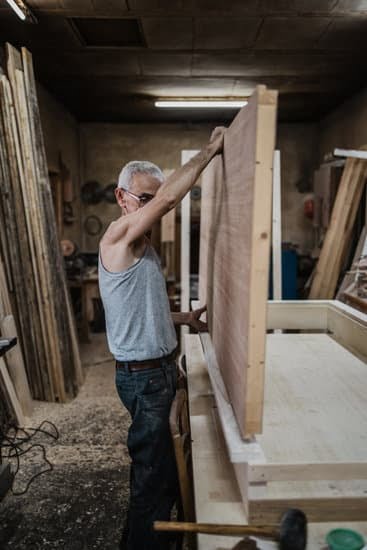What does a woodworking workshop need? Setting up a proper woodworking workshop is essential for anyone interested in pursuing woodworking as a hobby or profession. It is important to have the right tools, equipment, and workspace to ensure efficient and safe woodworking practices. In this article, we will discuss the essential components of a woodworking workshop and why they are important for any woodworker.
A well-equipped woodworking workshop requires a combination of hand tools, power tools, workbench, safety equipment, storage solutions, dust collection system, lighting, and electrical outlets. Each of these components plays a crucial role in creating a functional and productive workspace for woodworking projects.
Creating a proper woodworking workshop not only ensures that you have everything you need to work efficiently but also sets the foundation for honing your skills and exploring advanced techniques. Whether you are a beginner or an experienced woodworker, having the right setup can make all the difference in the quality of your work and your overall experience in the workshop. So, let’s delve into what it takes to set up the perfect woodworking workshop.
Essential Tools
| Tool | Description |
|---|---|
| Hand Saw | Used for cutting wood into different shapes and sizes. |
| Chisels | Essential for carving and shaping wood with precision. |
| Hammers and Mallets | For driving in nails, chisels, and other tools, as well as shaping wood. |
| Pocket-Hole Jig | Used to create strong joints for cabinets, bookshelves, tables, and more. |
In addition to these hand tools, it is also important to have power tools such as a table saw, circular saw, jigsaw, router, power drill, and orbital sander. These power tools will make cutting, shaping, drilling, and sanding tasks faster and more efficient. A combination of both hand and power tools will allow you to tackle various woodworking projects with ease.
Another crucial aspect of equipping a woodworking workshop with the necessary tools is investing in quality equipment that will last long term. While it may require a significant initial investment, high-quality tools will save money in the long run by providing consistent performance and durability. Furthermore. proper maintenance of these essential tools is also essential to ensure their longevity and functionality.
Workbench and Clamps
When setting up a woodworking workshop, one of the most essential elements to consider is the workbench and clamps. A sturdy and functional workbench is crucial for any woodworking project, providing a stable surface for cutting, shaping, and assembling wood. Additionally, having a variety of clamps is necessary for holding pieces of wood securely in place while working on them.
Here is a list of essential workbench tools and equipment that every woodworking workshop needs:
- Workbench: A solid work surface with sufficient space for your projects
- Woodworking Vise: For holding pieces of wood securely in place
- Bench Dogs: To support and hold workpieces on the bench surface
- Clamps: Various types such as bar clamps, pipe clamps, and spring clamps for securing wood during different stages of the project
- Anvil: For pounding and shaping metal components when making or repairing woodworking tools
In addition to the workbench itself, it’s important to have a range of high-quality clamps to suit different woodworking tasks. Some projects may require large bar clamps for heavy-duty tasks, while others may need smaller spring clamps for delicate or intricate work. Therefore, having a variety of clamp sizes and types ensures that you are well-equipped for any woodworking project.
Furthermore, when considering what does a woodworking workshop need in terms of workbenches and clamps, it’s also important to prioritize durability and stability. A solidly built workbench made from hardwood with a sturdy base provides the foundation needed for precision and safety in woodworking.
Likewise, investing in high-quality clamps will ensure that your materials stay firmly in place during cutting, sanding, drilling or joining processes. With a reliable workbench and an assortment of quality clamps at hand, you can create a safe and efficient workspace for all your woodworking endeavors.
Safety Equipment
When setting up a woodworking workshop, safety should always be a top priority. Proper safety equipment is essential to protect yourself and others from potential hazards while working with wood and power tools. Here are some of the most important safety items that your woodworking workshop needs:
- Safety goggles: Protect your eyes from flying debris and sawdust
- Hearing protection: Ear muffs or ear plugs to prevent hearing damage from loud machinery
- Dust mask or respirator: Essential for filtering out harmful particles and fumes from wood and finishing products
- Work gloves: Protect your hands from splinters, cuts, and other injuries
- First aid kit: Always have basic first aid supplies on hand in case of accidents or injuries
In addition to personal protective equipment, it’s important to consider the safety of the overall workshop environment. This includes fire extinguishers, proper ventilation to prevent dust buildup, and clear pathways to prevent tripping hazards.
By investing in quality safety equipment and maintaining a safe work environment, you can ensure that you and others in the workshop are protected from potential dangers while working on woodworking projects. Remember that no project is worth compromising on safety, so always make sure to prioritize this aspect when setting up your woodworking workshop.
Storage and Organization
One of the most important aspects of a woodworking workshop is keeping your tools and materials organized. Without proper storage and organization, it can be difficult to find what you need when you need it, leading to wasted time and frustration. Additionally, a cluttered workspace can also pose safety hazards, as sharp tools or loose materials may cause tripping or accidents.
When thinking about what does a woodworking workshop need in terms of storage and organization, one of the most essential items is a sturdy and spacious tool cabinet or chest. This will allow you to store your hand tools and smaller power tools in an organized manner, making them easily accessible when working on projects. Additionally, investing in a wall-mounted pegboard for hanging frequently used hand tools can also save space while keeping things within reach.
In addition to tool storage, it’s important to consider how you will organize your lumber and other materials. Sturdy shelving units are crucial for storing wood boards and sheet goods, preventing them from warping or getting damaged.
Clear plastic bins or containers are also useful for storing smaller hardware items like screws, nails, and other fasteners. Having a designated area for each type of material or tool not only makes the workshop look neater but also improves efficiency during woodworking projects.
| Aspect | Recommendation |
|---|---|
| Tool storage | Sturdy tool cabinet or chest; wall-mounted pegboard |
| Lumber storage | Sturdy shelving units; designated areas for wood boards and sheet goods |
| Material organization | Clear plastic bins or containers for small hardware items |
Dust Collection System
A woodworking workshop requires a dust collection system to maintain a clean and healthy working environment. Woodworking involves cutting, sanding, and shaping wood, which creates a significant amount of sawdust and debris. Without proper dust collection, this debris can not only create a mess but also pose health hazards to the woodworker.
Inhaling wood dust can lead to respiratory issues and other health problems in the long run. Therefore, investing in a reliable dust collection system is essential for any woodworking workshop.
There are various types of dust collection systems available on the market, ranging from portable units to large central systems. A good dust collection system should be able to capture particles of all sizes and efficiently remove them from the air and work surfaces.
This not only keeps the workshop clean but also prevents particles from settling on machinery and tools, which can affect their performance over time. Additionally, having a clean workspace improves overall productivity and creates a more pleasant working environment.
In addition to installing a high-quality dust collection system, it’s important to properly maintain and empty the system regularly. Neglecting maintenance can lead to clogs or reduced efficiency, rendering the system ineffective. Woodworkers should also wear appropriate protective gear such as masks and goggles when dealing with dust-producing tasks to further reduce health risks associated with woodworking activities.
By prioritizing the installation of a reliable dust collection system, woodworkers can ensure that their workshops remain clean, safe, and conducive to productive work. It’s an essential investment that ultimately contributes to both the quality of work and the well-being of those working in the shop.
Lighting and Electrical Outlets
When setting up a woodworking workshop, one of the key considerations is ensuring adequate lighting and access to electrical outlets. Proper lighting is essential for working with precision and accuracy, while having enough power outlets will prevent the need for extension cords or multiple power strips cluttering up your workspace.
Lighting
The type of lighting in your woodworking workshop can make a significant difference in the quality of your work. Natural light is ideal, so if possible, position your workshop in an area with windows. However, it’s also important to have artificial lighting in place for when natural light is insufficient. Overhead LED lights are a popular choice as they provide bright, even illumination without creating shadows.
Electrical Outlets
Having enough electrical outlets in your woodworking workshop is crucial for powering tools and equipment. Consider the layout of your workshop and the placement of your machinery when determining where to install outlets. It’s also a good idea to have dedicated circuits for heavy-duty tools like table saws and jointers to prevent overloading circuits.
In addition to standard electrical outlets, you may also want to consider installing specialty outlets such as those with built-in USB ports for charging handheld devices or retractable extension cords for added convenience. By ensuring that you have sufficient access to power throughout your workshop, you can eliminate potential hazards and work more efficiently.
Ultimately, proper lighting and ample electrical outlets are essential components of a functional woodworking workshop. By investing in quality lighting and strategically placing electrical outlets, you can create a safe and productive environment for pursuing your woodworking projects.
Additional Equipment
When it comes to advanced woodworking projects, having the right specialty tools and machines is essential to achieve professional results. These specialized equipment can help woodworkers take their craftsmanship to the next level and tackle more intricate and complex projects. Here are some of the key specialty tools and machines that a woodworking workshop needs for advanced woodworking projects.
Router Table
A router table is an indispensable tool for creating precise and intricate cuts, shapes, and designs on wood. It allows woodworkers to use a stationary router attached to a table, providing stability and accuracy when working on delicate details or edges. With a router table, woodworkers can create decorative moldings, joints, and grooves with ease.
Band Saw
A band saw is a must-have machine for any advanced woodworking workshop. This versatile tool is ideal for making curved cuts, resawing thick boards into thinner pieces, and cutting intricate shapes in wood. It offers woodworkers the flexibility to create complex designs and patterns that may be challenging with other cutting tools.
Biscuit Joiner
For precision joinery in advanced woodworking projects, a biscuit joiner is invaluable. This machine makes quick work of creating strong and seamless joints by cutting matching slots in adjoining pieces of wood and inserting biscuits (small wooden wafers). It ensures accurate alignment of pieces during assembly, resulting in professional-quality furniture and cabinetry.
These specialty tools and machines are essential additions to any woodworking workshop that aims to take on advanced projects. By investing in these equipment, woodworkers can expand their capabilities, work with greater precision, and achieve superior results in their craftmanship.
Conclusion
In conclusion, setting up a woodworking workshop requires careful consideration of several key factors. From essential tools and safety equipment to storage and organization, a well-equipped workshop is crucial for both efficiency and safety. It’s important to ensure that the workshop has the right foundation with a sturdy workbench and clamps, as well as proper lighting, electrical outlets, and a dust collection system to maintain a clean working environment.
When setting up a woodworking workshop, it’s essential to invest in quality tools that are necessary for various woodworking projects. Additionally, prioritizing safety with the appropriate equipment such as safety goggles, hearing protection, and dust masks should not be overlooked. Proper storage and organization of tools and materials will not only keep the workshop tidy but also contribute to improved productivity.
Furthermore, when considering additional equipment for advanced woodworking projects, it’s important to assess the specific needs of the workshop and invest in specialized tools or machines accordingly. By carefully considering all these factors when setting up a woodworking workshop, woodworkers can create a safe, efficient, and fully functional space for their craft. And ultimately enjoy their woodworking journey with peace of mind knowing they have everything they need within reach.
Frequently Asked Questions
What Do You Need to Start a Wood Workshop?
To start a wood workshop, you will need a dedicated space with good ventilation, proper lighting, and electrical outlets. You will also need essential safety equipment such as goggles, dust masks, and hearing protection.
How Do I Set Up a Woodworking Workshop?
Setting up a woodworking workshop involves organizing the space in a way that allows for easy access to tools and materials. This includes setting up workbenches, storage for hand and power tools, and creating designated areas for cutting, sanding, and finishing projects.
What Tools Does a Wood Shop Need?
A wood shop requires a variety of hand tools such as chisels, planes, saws, and measuring tools like squares and rulers. Power tools like table saws, drills, routers, sanders, and planers are also essential for efficient woodworking. Additionally, clamps, vises, workbenches, and dust collection systems are necessary for a well-equipped wood shop.

Hi everyone! I’m a woodworker and blogger, and this is my woodworking blog. In my blog, I share tips and tricks for woodworkers of all skill levels, as well as project ideas that you can try yourself.





